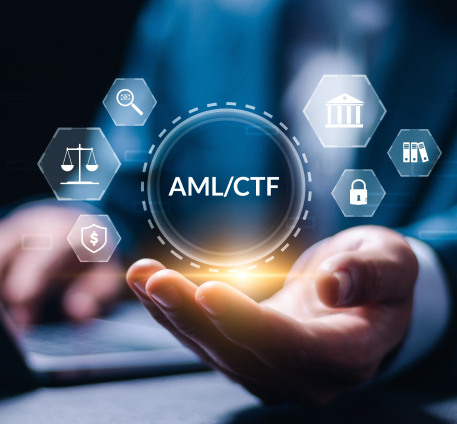AML/CTF: Compliance without the complexity
Learn more about InfoTrack's AML/CTF solutions
Your dedicated Client Relationship Manager will be available to demonstrate how InfoTrack can help equip you with the right tools.
Learn more about InfoTrack's AML/CTF solutions
Your dedicated Client Relationship Manager will be available to demonstrate how InfoTrack can help equip you with the right tools.

What the AML/CTF amendment Act 2024 means for legal and conveyancing firms
The Anti-Money Laundering and Counter-Terrorism Financing (AML/CTF) Amendment Act 2024 became law on 10 December 2024 and significantly impacts the legal industry, real estate industry and individuals buying and selling property. The reforms aim to close regulatory gaps by extending AML/CTF obligations to previously unregulated sectors, including legal and conveyancing.
If your business is now required to comply with AML/CTF regulations, it’s essential to understand your obligations and begin preparations as soon as possible. While the new requirements don’t take effect until 1 July 2026, the short compliance timeline and the limited availability of AML/CTF specialists in Australia mean demand for expertise will rise as the deadline approaches.
Under this new regime, law firms or licensed conveyancing firms are classified as a PSP, meaning you must adhere to AML/CTF regulations, and the services you provide are recognised as ‘Designated Services’.
This means your firm is subject to AML/CTF compliance measures, broadly covering:
- Conducting employment due diligence (EDD) obligations
- Conducting customer due diligence (CDD) including verifying clients' identities
- Reporting suspicious transactions to AUSTRAC
- Keeping records of transactions and client interactions, and
- Implementing a risk-based AML/CTF compliance program.

Get ready for Tranche 2: Essential AML/CTF training for lawyers and conveyancers
- Complimentary training
- 0.5 CPD unit
Recent updates: Revised AML/CTF rules from AUSTRAC’s initial consultation
AUSTRAC has released a revised draft of AML/CTF Rules, with key updates for lawyers, conveyancers, and real estate professionals. This second draft provides further guidance for Designated Non-Financial Businesses and Professions (DNFBPs), particularly in the context of property transactions.
The draft clarifies that client due diligence on purchasers may be delayed when required but must still be completed before settlement. Vendor checks remain unchanged and are required at the start of the designated service.
The rules also formalise reliance between real estate agents and conveyancers for Know Your Client (KYC) purposes and allow enhanced due diligence to be applied at any stage based on client risk. Verification of Identity (VOI) checks via InfoTrack’s DVS integration remain compliant.
Additional guidance on risk ratings and reporting is expected in future updates.

Learn more about InfoTrack's AML/CTF solutions
Learn more about InfoTrack's AML/CTF solutions
Your dedicated Client Relationship Manager will be available to demonstrate how InfoTrack can help equip you with the right tools.
Finally, InfoTrack is committed to continuing to provide input and guidance into the AUSTRAC consultation phase of the regime and will advocate for legal technology that serves your firm’s best interests.
Checklist: Your firm’s journey to compliance
AML/CTF Compliance Program
Firms will need to develop or choose a service provider to implement an AML/CTF Compliance Program
- AML/CTF project lead appointed
- Internal risk assessments to identify vulnerabilities
- Staff training on AML/CTF obligations
- Policies and procedures for CDD, reporting, and record-keeping
- Regular audits and updates to reflect new risks
Lawyers and conveyancers will need to verify their clients’ identities before providing a Designated Service. This includes:
- Identifying and verifying clients using reliable, independent documents (e.g., passports, driver's licenses).
- Identifying beneficial owners (e.g., trusts, companies) to prevent the use of legal services for money laundering.
- Assessing risk : Firms must classify clients based on risk levels (e.g., high-risk clients may require enhanced due diligence).
- Ongoing monitoring: Regularly review client activities to detect suspicious transactions.
- Suspicious transactions must be reported within three business days.
- If terrorism financing is suspected, it must be reported immediately.
- Identity verification documents
- Client due diligence assessments
- Transaction details
- Communications
- Reports submitted to AUSTRAC




